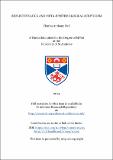Files in this item
Reflective luck and meta-epistemological scepticism
Item metadata
| dc.contributor.advisor | Ebert, Philip A. | |
| dc.contributor.advisor | Greenough, Patrick | |
| dc.contributor.author | Neil, Charles Anthony | |
| dc.coverage.spatial | 95 p. | en_US |
| dc.date.accessioned | 2017-01-31T12:33:36Z | |
| dc.date.available | 2017-01-31T12:33:36Z | |
| dc.date.issued | 2014 | |
| dc.identifier.uri | https://hdl.handle.net/10023/10205 | |
| dc.description.abstract | In this thesis, I argue that a particular type of epistemic luck, called “reflective luck”, motivates a meta-epistemological challenge to externalism about justification. I argue that the meta-epistemological challenge consists in a substantive philosophical challenge to externalism that entails the rejection of a naturalized epistemology. However, I contend that the philosophical challenge to the externalist analysis of justification should be tempered with an anti-sceptical intuition that we do have knowledge of putatively true propositions. To this end, I argue that an externalist analysis of justification is best able to accommodate our anti-sceptical intuitions; externalism, I argue, is the best way of accommodating commonsense. Although externalism is preserved and survives the meta-epistemological challenge, it is not unscathed. Specifically, I contend that externalism deprives us of adequate internalist epistemic grounds to think that we have externalistically justified beliefs. I identify that in principle this is not a problem for externalism, because externalism can respond in a number of ways (one way is to abandon the concept of justification as essential to knowledge), but that nonetheless an adequate epistemology ought to do justice to the legitimacy of the meta-epistemological challenge. However, accommodating this legitimacy and preserving putative knowledge is not possible within the traditional absolutist framework for doing epistemology. My conclusion is that externalism is correct, but that the kind of externalist knowledge we have is not especially fine-grained or perfect; this should put pressure on the absolutist framework for doing epistemology. | en_US |
| dc.language.iso | en | en_US |
| dc.publisher | University of St Andrews | |
| dc.subject.lcc | BD212.N4 | |
| dc.subject.lcsh | Justification (Theory of knowledge) | en |
| dc.subject.lcsh | Knowledge, Theory of | en |
| dc.subject.lcsh | Skepticism | en |
| dc.title | Reflective luck and meta-epistemological scepticism | en_US |
| dc.type | Thesis | en_US |
| dc.type.qualificationlevel | Doctoral | en_US |
| dc.type.qualificationname | MPhil Master of Philosophy | en_US |
| dc.publisher.institution | The University of St Andrews | en_US |
| dc.rights.embargoreason | Embargo period has ended, thesis made available in accordance with University regulations. | en |
| dc.identifier.doi | https://doi.org/10.17630/10023-10205 |
This item appears in the following Collection(s)
Items in the St Andrews Research Repository are protected by copyright, with all rights reserved, unless otherwise indicated.

